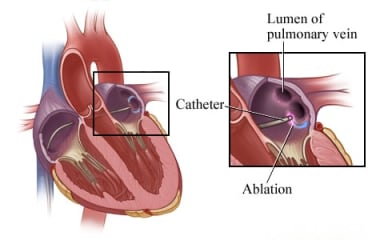What is catheter ablation?

Catheter ablation is a procedure that treats heart rhythm problems. These problems include atrial fibrillation, supraventricular tachycardia (SVT), atrial flutter, and ventricular tachycardia.
Your heart should have a strong, steady beat. That beat is controlled by the heart's electrical system. Sometimes that system misfires. This causes a heartbeat that is too fast and isn't steady.
Catheter ablation is a way to get into your heart and fix the problem. Ablation is not surgery.
How is catheter ablation done?
Your doctor inserts thin tubes called catheters into a blood vessel in your groin, arm, or neck. Then your doctor feeds the catheters into the heart. Wires in the catheters help the doctor find the problem areas. Then the doctor uses the wires to send energy to destroy the tiny areas of heart tissue that are causing the problems.
The main types of ablation are:
Thermal ablation. This is the most common type of heart ablation. It uses either heat (radiofrequency) or extreme cold (cryoablation) to destroy the small areas of heart tissue causing the abnormal rhythm.
Pulsed field ablation (PFA). PFA uses short, high-voltage electrical pulses to target and destroy only the heart cells causing the abnormal rhythm. Since it only targets the problem areas, PFA may lower the risk of damage to nearby areas like the esophagus, nerves, or blood vessels. It is mainly used to treat atrial fibrillation.
It may seem like a bad idea to destroy parts of your heart on purpose. But the areas that are destroyed are very tiny. They should not affect your heart's ability to do its job.
You may be awake during the procedure. Or you may be asleep. The doctor will give you medicines to help you feel relaxed and to numb the areas where the catheters go in.
What can you expect after catheter ablation?
You may stay overnight in the hospital.
You can do light activities at home. Don't do anything strenuous until your doctor says it is okay. This may be for several days.
You may have swelling, bruising, or a small lump around the site where the catheters went into your body. These should go away in 3 to 4 weeks.
You may have to take some medicines for a while.
Follow-up care is a key part of your treatment and safety. Be sure to make and go to all appointments, and contact your doctor if you are having problems. It's also a good idea to know your test results and keep a list of the medicines you take.
Where can you learn more?
Go to http://www.healthwise.net/patientEd
Enter N533 in the search box to learn more about "Learning About Catheter Ablation for Heart Rhythm Problems".
Current as of: October 2, 2025
Author: Ignite Healthwise, LLC Staff
Clinical Review Board
All Ignite Healthwise, LLC education is reviewed by a team that includes physicians, nurses, advanced practitioners, registered dieticians, and other healthcare professionals.

